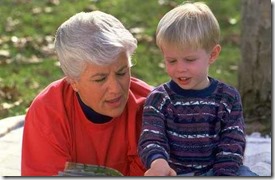 Dori has been taking care of her two children by herself since she was 18.
Dori has been taking care of her two children by herself since she was 18.
She anticipated that many of the financial challenges, the emotional ups and downs, and the constant juggling act would end once her children became adults and headed out on their own.
I know what you’re thinking: This is going to be a story about the legions of baby boomer parents whose adult children have returned home to live. If so, you’d be wrong.
What Dori is experiencing will stretch her financial and emotional limits for many, many years to come. At 56, she is a grandparent raising her 2-year old grandson, Luke.
A year ago in the middle of the night, Dori received a call from Child Protective Services. They had Luke in custody; her daughter was in jail—a result of using and dealing drugs.
CPS was looking for alternative care for Luke and Dori had been identified as a grandparent. If she did not take him, the infant boy would be remanded to foster care.
According to the 2010 census, Dori is one of more than 2,000 grandparents caring for a related child in the Conejo Valley. A small percentage of these children come into the care of their grandparents through CPS, a result of their parent’s drug or alcohol problems, allegations of child abuse or neglect, or run-ins with the law.
Doug Miller, kinship program consultant for Kids and Families Together, a nonprofit support, education and counseling resource center based in Camarillo, says these are examples of formal kinship care. But informal kinship care occurs far more frequently, when, for example, a grandparent steps forward because a son or daughter has been called to active military duty or because they are trying to recover from a serious illness.
The rules regarding families formally involved in kinship care are not very different from the rules for foster care. In Dori’s case, she had to be fingerprinted, pass both a criminal record check and a home visit.
Her home had to be safe. Luke had to have a bed of his own and his own space. Dori went through an orientation and had to agree to assume the obligations and responsibilities of caring for a child before Luke was placed in her custody.
Whether, like Dori, you are grandparents caring for a grandchild or an aunt or uncle caring for a niece or nephew, most families providing kinship care have similar needs.
Financial concerns are common. According to the UCLA Center for Human Policy Research, 43 percent of California seniors raising their grandchildren don’t have enough money to do it. Many are retired and receive most of their income from Social Security.
Medical coverage for a grandchild can become a problem. Just because a grandparent has assumed responsibility for their grandchild, it’s doubtful that their health insurance provider will cover the child.
Many deal with behavior management issues. The children have feelings of anger and abandonment, and other emotional issues stemming from their family situation.
Many have housing issues. Grandparents who are low-income or who have downsized may be living in a one-bedroom apartment that will not meet the requirements for foster care.
Most of all, according to Miller, grandparents raising grandkids can feel isolated. Often they do not share their situation with friends out of embarrassment or fear.
The rules for raising and parenting children have changed dramatically in the last 20 years. These grandparents don’t fit into either social network—the parent cohort raising young children or the empty nesters moving toward retirement.
To conquer that social isolation, Senior Concerns and Kids and Families Together are working together to provide a support network for grandparents raising grandkids. The first meeting will be from 7 to 8 p.m. Mon., Oct. 28 at Senior Concerns, 401 Hodencamp Road, Thousand Oaks.
Light refreshments will be served, and child care will be provided if advance reservations are made. To RSVP, call (805) 497-0189.
To learn more about Kids and Families Together, go to www.kidsandfamilies.org.
More ...
Tags: Kids and Families Together,grandparents as parents